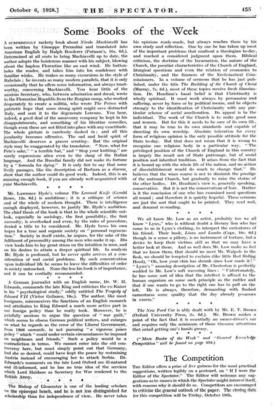The Bishop of Gloucester is one of the leading scholars
nu the episcopal bench, and he is not less distinguished for scholarship than for independence of views • He never takes
his opinions ready-made, but always reaches them by his own study and reflection. One by one he has taken up most
of the important problems that confront a theologian to-day,
and reached a considered judgment upon them. Biblical criticism, the doctrine of the Incarnation, the nature of the Church, the peculiar characteristics of the Church of England, liturgical questions and even the relation of economics to Christianity, and the finances of the' Ecclesiastical C.Om- inissioners. In a volume of sermons that he has just pub-
lished, under the title The Building of the Church of Christ (Murray, 75. 6d.), most of these topics receive fresh illumina- tion. Dr. Headlam's basal belief is that Christianity is wholly spiritual. It must work always by persuasion and suffering, never by force or by political means, and he objects strongly to the identification of- Christianity with any -par- ticular scheme of social amelioration. Its appeal is to the individual. The work of the Church is to make good men and women. But for this it needs to be sure of its own life, that it may be true to its own standards and capable of directing its own worship. Absolute toleration for every form of religious opinion is the only possible attitude for 'the State to-day. But that does not mean that it is wrong to recognize one religious body in a particular way. ". The privileged position of the Church of England in this country is largely the result not of State patronage, but of social position and inherited tradition. It arises from the fact that it is bound up with the whole life of the nation, and no action of disestablishment would do much to change that." He believes that the wiser course is not to diminish the prestige of the national Church, but gradually to raise the status' of the other bodies. Dr. Headlam's view is, generally speaking, conservative. But it is not the conservatism of fear. Rather is it the conclusion of one who has examined most questions all round ; and therefore it is quietly hopeful. These sermons are just the sort that ought to be printed. They read well, and demand re-reading.
* * * *






















































 Previous page
Previous page